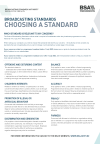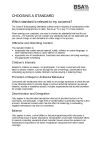Which standard is relevant to my concerns?
The Code of Broadcasting Standards outlines what is required of broadcasters when they broadcast programmes on radio, free-to-air TV or pay TV in New Zealand.
When making your complaint, you need to choose the standards that best fit your concerns – the Authority will not consider any standards that are not applicable and you cannot change or add standards at a later stage in the process.
See this short video to get started.
The standards
Offensive and Disturbing Content
This standard relates to:
- broadcasts that contain sexual material, nudity, violence or coarse language, or other material that is likely to cause offence or distress
- appropriate use of classifications, timebands and advisories (including warnings) and appropriate scheduling.
Children's Interests
Relates to children as viewers, not participants. It is mainly concerned with steps taken to protect children, such as through the use of warnings, classifications and scheduling (eg during or outside children's normal viewing or listening times).
Promotion of Illegal or Antisocial Behaviour
Concerned with broadcasts which are likely to encourage audiences to break the law or are otherwise likely to promote illegal or serious antisocial behaviour (eg sexual violence, suicide or substance abuse). Includes requirements that alcohol promotion be socially responsible.
Discrimination and Denigration
Only applies to discrimination/denigration directed at specified sections of the community, not individuals. A high level of condemnation is generally required to find a breach. Broadcast content which has the effect of reinforcing or embedding negative stereotypes may also be considered.
Balance
Only applies to news, current affairs or factual programming which discusses a controversial issue of public importance. Broadcasters must make reasonable efforts to present competing viewpoints about important issues unless the audience can reasonably be expected to be aware of significant viewpoints from other media coverage.
Accuracy
Only applies to news, current affairs or factual programming. Programmes should be accurate in relation to 'material points of fact' and should not mislead. Requires broadcasters to correct significant errors of fact within a reasonable period.
Privacy
Only applies to identifiable individuals featured in the broadcast or directly affected by it. Key issues include whether a person had a reasonable expectation of privacy, whether private information was disclosed and whether the disclosure or intrusion was highly offensive.
Fairness
Concerned with fairness to individuals or organisations taking part or referred to in a programme. Key issues include informed consent, informed participation and reasonable opportunity to comment.
Download the Guide in Various Languages

